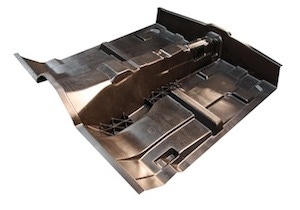USCAR Wins Patent for Composite Floor Pan
April 11, 2011

The U.S.Patent Office awarded a patent on the concept of a composite automotive floorpan to the United States Council for Automotive Research LLC (USCAR), thecollaborative automotive technology organization of Chrysler, Ford Motor andGeneral Motors.
USCAR Wins Patent for Composite Floor Pan |
"Ifstructural composite panels can move into production, one molded fabric SMC (sheetmolding compound) floor panel could replace up to 17 steel parts and shed up to25 pounds from the weight of a typical passenger car," says Libby Berger,project chair and staff researcher in General Motors' Chemical Sciences andMaterials Systems Lab. "This patent is among the many great milestones of thisproject."
The USCAR programthat performed the research is called the U.S. Automotive Materials PartnershipLLC (USAMP) Automotive Composites Consortium (ACC).
The patentapplies to a multi-layered composite automotive floor pan that defines part ofthe passenger compartment and includes a high-elongation fabric layersandwiched between glass fabric layers.
The floorpan is configured to absorb or transfer dynamic external loads (crash forces).The composite pan passed load tests while maintaining the material integrity ofthe floor pan.
"The ACC composite underbody project has beena very successful collaboration among a remarkable array of suppliers andresearchers from academia and the auto industry," says Berger.
The SMCcomposite used by the ACC combines glass fiber and polyester. Carbon-fiberreinforced plastic composites remain too expensive for large-scale automotiveuse.
There arescale-related production problems for thermoset composite plastic technologies,carbon and glass.
Currently,SMC component manufacturers use chopped fiberglass and resin to mold a varietyof parts such as wheel housing supports, instrument panels, andappearance-grade or surface-quality parts, such as trunk lids and doors.
Fiberglassfabric, while more structurally robust, has unique and more complex formingrequirements. How multiple layers arejoined and preformed, and how deformation affects material properties are amongthe areas continuing to be researched by ACC.
In additionto the three USCAR-based automakers represented by ACC, participants in theproject include the U.S. Department of Energy, which provided partial fundingfor the project through a cooperative agreement with USAMP; MultimaticEngineering; Century Tool & Gage Inc.; Continental Structural Plastics;Wolfden Products Inc.; IBIS Associates; Camanoe Associates; and researchersfrom the University of Massachusetts-Lowell.
USCARwas founded in 1992.
About the Author(s)
You May Also Like






